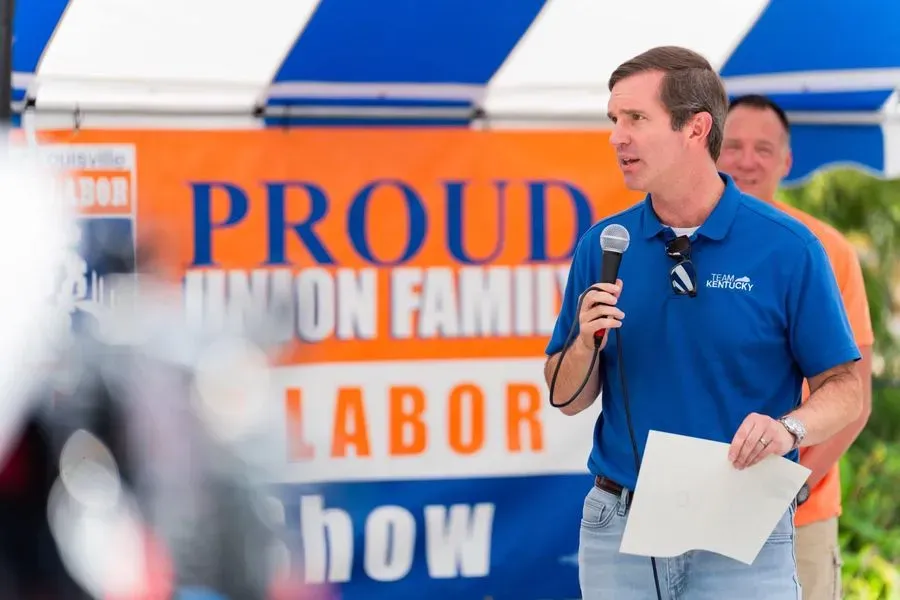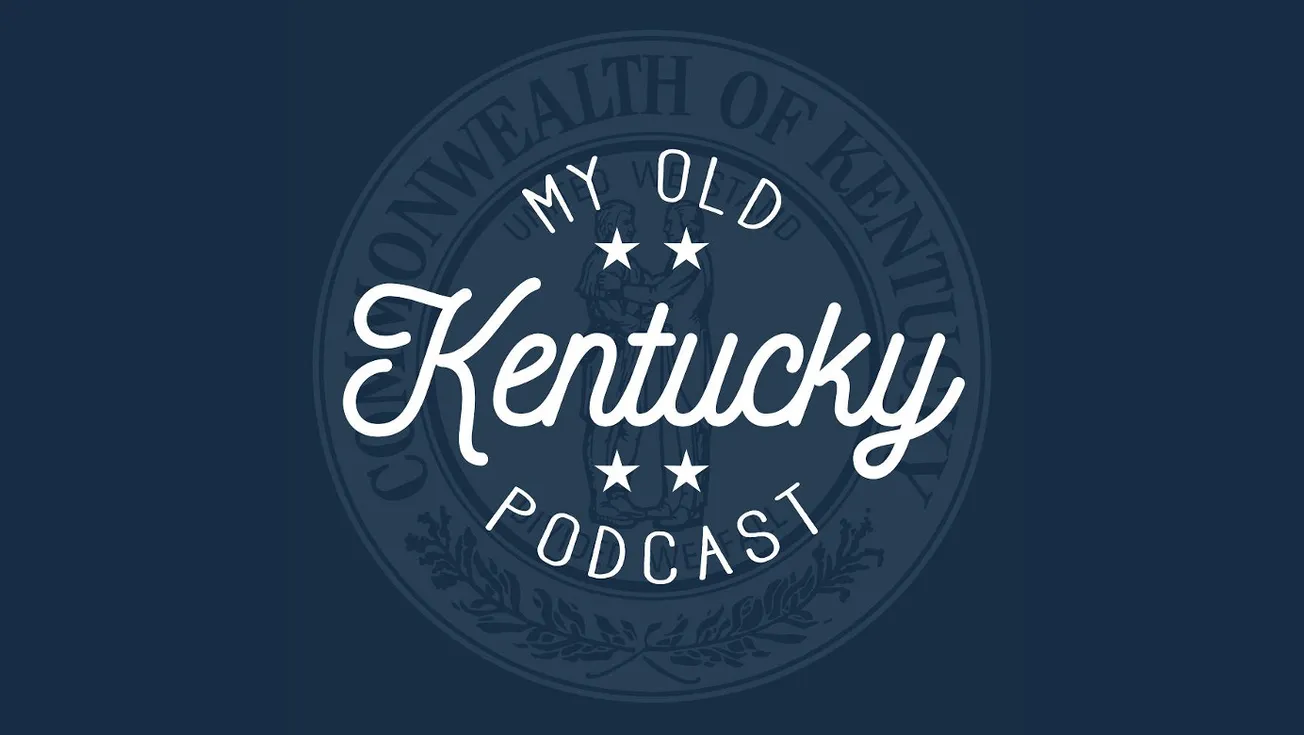Pick a cliché: Now or never. Crunch time. Backs against the wall. Do or die.
They all apply to the governor’s race, if you pack a union card.
“If we don’t have [Andy] Beshear back in there, we won’t have a firewall any more. They will control every branch of government. [Daniel Cameron] will be a replay of Matt Bevin,” warned Robert Harrington at a Paducah fundraiser for the governor Friday evening. Harrington is a Plumbers and Steamfitters Local 184 and IAM Local 1720 retiree.
Cameron, a hard-right Republican and the state’s attorney general, is seeking to unseat the moderate Democrat Beshear on Tuesday.
Veteran union activist Larry Sanderson was at the fundraiser, too. “Andy Beshear is our friend. You elect your friends and defeat your enemies – it’s as simple as that,” said the retired UA international representative for Kentucky and Tennessee.
It really is that simple.
Bevin II, the sequel
Bevin, an ultraconservative Republican, was elected governor in 2015 after promising to push for a “right to work law.” An anti-union GOP Senate majority was equally eager to pass RTW, but organized labor had a firewall – a pro-union Democratic-majority House.
The firewall crumbled into a dusty heap on Nov. 8, 2016, when the GOP flipped the House. After the General Assembly convened in January, 2017, the Republicans lost no time in approving “right to work” legislation and a measure to repeal the state prevailing wage law. Bevin gleefully signed both bills.
Beshear, endorsed by the Kentucky State AFL-CIO, beat Bevin — barely — four years ago. His win slowed, but didn't stop, the GOP’s crusade against unions. Beshear has been stymied by veto-proof Republican supermajorities in both chambers which have overridden his vetoes at will.
But his executive orders and appointments to agencies and boards have to some extent shielded organized labor from the legislature’s anti-union zeal. That shield will be gone if Cameron wins.
Cameron: Anti-union from the start
Cameron was elected AG in 2019. Even before he decided to try for Beshear’s job, the state’s top cop revealed where he stood on unions. In 2021, he and 13 other GOP attorneys general sent a letter to the U.S. Senate leadership urging defeat of the PRO Act.
“The Commonwealth has already made it clear where we stand on this issue by passing a Right-to-Work law in 2017, and our letter opposes the PRO Act because it would undermine this important law and the will of Kentuckians,” Cameron said in a news release about the letter. “It’s my job to defend our laws as they are passed by the General Assembly, and to push back against federal legislation that would harm Kentucky workers.”
Cameron’s official campaign website pledges that when he’s governor, “every policy decision will be made with working people in mind.”
Harm Kentucky workers? Working people in mind?
“Right to work” laws are pushed by employers, not workers. They are calculated to drive down wages, which is why unions call them “the right to work for less.” On average, wages are lower in RTW states than in non-RTW states. RTW states are among the poorest states.
“Right to work” is a deliberate misnomer. Under a “right to work” law, hourly employees at a unionized workplace can enjoy union-won wages and benefits without joining the union or paying the union a service fee to represent them.
“In our glorious fight for civil rights, we must guard against being fooled by false slogans, such as ‘right to work.’ It is a law to rob us of our civil rights and job rights,” Dr. Martin Luther King Jr. said in 1961. “Its purpose is to destroy labor unions and the freedom of collective bargaining by which unions have improved wages and working conditions of everyone. ... Wherever these laws have been passed, wages are lower, job opportunities are fewer, and there are no civil rights. We do not intend to let them do this to us. We demand this fraud be stopped. Our weapon is our vote.”
The company we keep
It's said we’re known by the company we keep. Many times it’s true.
Cameron’s running mate is state Sen. Robby Mills, one of the most anti-labor lawmakers in Frankfort. When he was a state representative, he voted for RTW and for axing PW. “He might even be worse than Cameron,” said Jeff Wiggins, state AFL-CIO secretary-treasurer.
On the other hand, Lt. Jacqueline Coleman praises unions. Gov. Beshear “is willing to treat every Kentucky family like his own, and that’s what labor does,” she said at Paducah’s 33rd annual Martin Luther King Jr. luncheon last January. Added Coleman, a former educator: “It is hard to put into words the impact that labor has had on the commonwealth and all of our lives. To have those folks with us in this journey is important because they have been, next to teachers, one of the most marginalized groups that we’ve seen in Kentucky politics – the way they have been treated over the last few years.”
Beshear, endorsed again by the state AFL-CIO, visited this year’s annual Louisville Labor Day picnic. “I was grateful to shake the hands of so many hardworking Kentuckians today at the 23rd Annual Greater Louisville United Labor Picnic,” he posted on X (formerly Twitter). “Thanks to you and our strong workforce, our economy is strong and our future is bright.”
In addition, the governor posted on Facebook, “It was great to be with y’all at the 23rd Annual Greater Louisville United Labor Picnic today! Unions bring hope to an individual, security to a family, and prosperity to the Commonwealth. Together we’re building an economy that works for all – not just the few.”
Cameron had plenty of chances to drop by a union-oriented Labor Day program. They were held statewide from Paducah to Catlettsburg.
Instead, he, Mills, and other Republicans attended the Grayson County Labor Day Parade in Leitchfield. The official parade tee shirt proclaimed “I’D VOTE FOR LAETTNER BEFORE BESHEAR,” a reference to Duke basketball star Christian Laettner whose buzzer-beating shot eliminated Kentucky from the 1992 NCAA basketball tournament. The tee shirt, plus the presence of Cameron, Mills, and the other GOP luminaries, strongly suggested that the festivities amounted to a Republican rally, not a program honoring working people.
Last month, Beshear brought a box of fresh sandwiches — which he paid for out of his pocket — to striking UAW Local 862 workers at the big Kentucky Ford Truck Plant in Louisville.
“Folks, I’m Andy Beshear and I’m the proud pro-union governor of the Commonwealth of Kentucky,” he introduced himself. “But I wanted to be here today not as governor but as a dad and somebody with a family, knowing that you are sacrificing right now for so many Kentucky families to have better wages, better benefits, and ensure that everybody gets home safely at the end of the day.”
The governor said he was “so proud of your fight” and for the Autoworkers “standing up for our Kentucky families.”
Beshear or Lt. Gov. Coleman, or both, regularly show up at union gatherings. Maybe I missed it. But I've never seen or heard of Cameron or Mills stopping by a union hall or going anywhere close to a union function.
Bottom line: By word and deed, the Beshear-Coleman team is in our corner. By word and deed, Cameron and Mills aren’t.
What might a Cameron administration mean for organized labor?
“It's scary to even imagine,” IUPAT retiree Al Cunningham said of a Cameron victory. “Every year you think the legislature can’t do any more. They do, and they’ll keep at it until [the union movement] is just totally gone,” added the former IUPAT District Council 91 representative, who also attended the Paducah Beshear fundraiser.
So how might the legislature — egged on by a Gov. Cameron — “keep at it” come January? “The sky’s the limit,” said Bill Londrigan, state AFL-CIO president.
--30--







